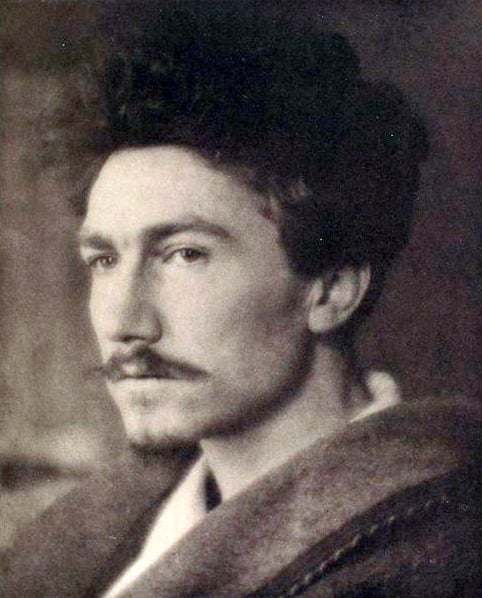Midwinter Madness
By:
February 10, 2012

MIDWINTER MADNESS
from Poems (1916)
A month or twain to live on honeycomb
Is pleasant — but to eat it for a year
Is simply beastly. Thus the poet spake,
Feeling how sticky all his stomach was
With hivings of ten thousand cheated bees.
O wisdom that could shape immortal words
And frame a diet for dyspeptic man!
But what of turnips? Come, a lyric now
Upon the luscious roots unsung as yet,
(Not roots I know but stalks; still, never mind,
Metre and sauce will suit them just as well)
Or shall we speak of omelettes? Muse, begin!
To feed a fortnight on transmuted eggs
Would doubtless be both comforting and cheap
But oh, the nausea on the fourteenth day!
I’d rather read a book by Ezra Pound
Then choke the seven hundredth omelette down,
Just as I’d rather read some F. S. Flint
Than live a month or twain on honeycomb.
O Ezra Pound! O omelette of the world!
Concocted with strange herbs from dead Provence,
Garlic from Italy and spice from Greece,
Having suffered a rare Pound-change on the way,
How rarely shouldst thou taste, were not the eggs
Laid in America and hither brought
Too late. I don’t like omelettes made with fowls.
Take hence this Pound and put him to the test,
Try him with acid, see if he turn black
As will the best old silver, when enraged
At touching fungi of the baser sort.
(Forgive digression. These similitudes
Entrance me and I lose myself in them,
As schoolboys, picking flowers by the way,
Escape the angry usher’s vigilance
And then, concealed behind a hedge or shed,
Produce the awesome pipe or thrice-lit fag
And make themselves incredibly unwell.)
My brain is bubbling and the thoughts will out,
But, Ezra Pound! they turn again to thee,
As surely as the lode-stone to the Pole
Or as the dog to what he hath cast up
(A simile of Solomon’s, not mine)
And your shock head of damp, unwholesome hay,
Such as, the cunning farmer oft declares,
When stacked, will perish by spontaneous fire,
Frequents my dreams and makes them ludicrous.
Thou most ridiculous sprite! Thou ponderous fairy!
Bourgeois Bohemian! Innocent Verlaine!
I read in The Booksellers’ Circular
That, in the University of Pa.
(Or Kans. or Col. or Mass, or Tex. or Ont.
—A line of normal pattern, Saintsbury)
You hold a fellowship in (O merciful gods!)
Romanics, which strange word interpreted
Means, I suppose, the Romance languages.
Doubtless they read Italian in Pa.
And some may speak French fluently in Ont.
But German, Ezra! There’s the bloody rub,
It’s not Romance and it is hard to learn
And Heine, though an easy-going chap,
Would doubtless trounce you soundly if he knew
The sorry hash that you have made of him.
But no! you’re not for immortality,
Not even such as that of Freiligrath,
Enshrined, together with his Mohrenfürst,
In unrelenting amber. I hold you here,
In a soap-bubble’s iridescent walls,
The whimsy of a long midwinter night,
And give you immortality enough.
Thou sorry brat! Thou transatlantic clown!
That seek’st to ape the treadless Ariel
And out-top Shelley in an aeroplane,
Take the all-obvious padding from your pants
And cut your hair and go to Pa. again
(Or Kans. or Col. or Mass, or Tex. or Ont.
Or even Oomp. if such a place exist)
And take with you the poets you admire,
Both Yeats and Flint to charm the folk of Oomp.
And write again for Munsey’s Magazine
Of your good brother Everyone. (Just God!
Am even I of his relationship?)
So end as you began or even worse:
No matter, so ’tis in America.
F.S. Flint (1885-1960) was an English poet who, under the influence of Ezra Pound, became a leading spokesman for Imagism and exemplified its methods in his 1915 collection Cadences.
“Or as the dog to what he hath cast up”: According to Proverbs 26:11, “As a dog returneth to his vomit, so a fool returneth to his folly.” In 1919, Rudyard Kipling would quote the same line in his declinist poem “The Gods of the Copybook Headings.”
Ferdinand Freiligrath (1810-76) was a German poet, translator and liberal agitator. His romantic, didactic anti-slavery poem “Der Mohrenfürst” was famously parodied by Heinrich Heine’s anti-romantic, anti-didactic “Atta Troll” (1847).
Munsey’s Magazine: America’s first mass-market (middlebrow) magazine. Before he became a pioneering figure in the early modernist movement in poetry, Pound wrote book reviews — and published at least one poem — in Munsey’s.
